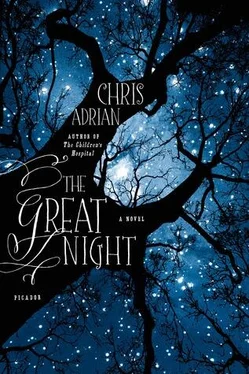They came to the final number, the revelation that Soylent Green was people, and Huff put it in his singing, though it wasn’t in the words, that the secret was out and could never again be put back in. The lovely last few bars (where half the cast sang “Up with people!” while the other half sang “Soylent Green is people!”) rang softly over the clearing. It was a tactical decision to end on a gentle, plaintive note instead of an abrasive, accusing, and militaristic one — Huff decided, at the very end, that he would take the great risk of appealing to the mummified little portion of humanity in the Mayor’s heart, rather than trying to bully him into doing the right thing. He kept his focus almost all the way through, but lost it in the last bars of that last number. Tears obscured his vision and he lost sight of his cast members. Still singing, their stationary forms melted into something else altogether. He waved his arms, trying to make it stop, but if he had ever had any control over the play, he had none now. The pretend smokestacks blew real smoke and the lovely singing gave way to a high continuous whine of machinery and the odor of grass and sweat and eucalyptus and rosemary was replaced with something else, sharp and brittle and sickly sweet all at once. It was the odor of Soylent Green. Something had gone horribly wrong: singing about a thing had made it so; now they would all be meat, and it was just as terrible, after all, as it was delightful, to want something and to get it. He covered his hands, and wept, and failed to notice that the Mayor was weeping too.
It was curious, Molly thought, during the little orgy, how she didn’t begin to behave like she was dreaming until she became convinced she wasn’t dreaming. She had conducted herself with a pretty respectable sort of propriety, aside from drinking very freely from that wine bottle, when she was sure that she had diverged in the woods of the park from the real world, and that everything happening that night was a drama enacted as a by-product of the meltdown of her tortured subconscious. Now she knew she actually had diverged from reality somewhere in those woods, but not in a way that impugned her sanity, and now she knew that everything she did in this unreal world would have real-world consequences, and yet here she was trying to get two dicks in her mouth at the same time, something she never would have tried even in her dreams.
This was what it was like, she supposed, to reach the end of your rope and then let go. It would be no surprise to her mother, she was sure, that saying no to Jesus would eventually mean saying yes to two dicks in your mouth in a topsy-turvy kingdom of little people under the ground. You say that like it’s a bad thing , she said to her mother, not meaning that this double fellatio was exactly a virtue. What she meant, and what she wanted to tell her mother, was that everything was suddenly a lot more complicated. The two dicks were merely representatives of the fact that she felt suddenly like she could do anything, and her free fall had more in common, she thought, with what happened when you let go of the rope swing than what happened just before you hit the bottom of the well.
She didn’t have much of a clue as to why this should be, why everything shouldn’t have gotten even more confusing or horrifying when it all turned out not to be made up, until Peabo showed up at the foot of the bed. Her first reaction, beyond surprise at how suddenly he appeared and horror at the menace that seemed to radiate from him, was relief. He really was black, but he wasn’t really Peabo. And in the instant that she understood this, she understood as well that she hated him, and she wanted to do him a terrible harm. Anger overcame her horror, and she leaped to intercept him as he was reaching for one of her boys, thinking, in midair, You did it to him. It’s not my fault, it’s yours!
What that meant exactly remained to be puzzled out (though it wasn’t really much of a puzzle) during her subsequent captivity. Peabo plucked her out of the air like a balloon, or he popped her like a floating bubble, or he batted her aside like a shuttlecock — it felt like all those things. She did what he told her and watched mutely with Will at her side as he had his tender, horrible reunion with Henry. That , she would have said, as she watched Henry shrink against the head of the bed, trying to avoid the reaching touch of the boy. If she could have spoken, she would have said, That’s what you did! You made his whole life like that! Because Henry’s weeping gyrations had the character, she thought, of Ryan’s whole life with her. She watched as the sheets rose up and attacked the boy, as the air over the bed became a wall of mist and then a wall of wood and then a wall of iron, as black birds detached out of the darkness above them to swoop down at him. The sheets burst into flame when they touched his skin; he walked through mist and wood and iron alike, and he ate all the birds in one bite. Then he had Henry, still weeping, in his arms, and he was saying, “There, there. I’ve got you now. My own dear friend, I’ve got you forever.”
Let him go! Molly kept thinking, though she knew she should be thinking Let me go! But, though she was shortly bridled like a horse and he was sitting on a golden pillow, Henry’s captivity felt more onerous than hers or Will’s. Let him go! she shouted again inside herself, not just at Peabo and Henry but at whatever spirits of the air had tortured and confined Ryan, and she wept bitterly, even before the horrible musical began. She wanted someone to do something, and couldn’t understand at all, when they ran into their former supposed guides and guardians, why none of them tried harder to overcome Peabo, or, when they encountered the whole otherly population of the park, why they chose to sing and dance instead of scream and fight.
Somebody should do something! she thought, struggling mightily with her bonds, though to anyone watching it looked like she was just standing there watching the ridiculous musical. She hated musicals. There was no worse waste of time on the whole planet, and though she knew there were worse tortures than to be made to sit through one, it still felt like an exquisite misery to be stuck there with invisible toothpicks holding her eyes open. This is what you missed? she asked Ryan. The lyrics were asinine, and the action was stupid, yet she found herself moved, inexplicably at first, but then it was obvious why she was crying, since the action had suddenly veered from futuristic San Francisco to Ryan’s garden. Don’t go in there! she shouted, not making a peep, to the fat homeless lady who was playing her part, but she went through the gate and walked down the hall and came out in the garden, singing something about how hard it was to get out of bed every morning, and doing a little dance, leaping and twirling on point beneath the tree until a man in a moon costume, whose face shone like white gold, was hoisted on a pole and lit the tree and the garden, revealing Ryan’s body where it had been swinging the whole time, a purple-faced slouch-shouldered dance partner. Homeless-lady Molly dropped to her knees, arching her back and putting her hand in her mouth and staring at her lover with eyes that seemed to leap out of her head on coils, and sang a fist-muffled aria.
Molly wanted so much to be able to move, to throw something at the players, or rush forward and cut Ryan’s body down from the silver tree, or tear out her hair, or at least speak, but when she found her voice again she could only shriek and weep in conversation with Ryan like she had when she had found him, two years ago and two miles away. But back then she was asking why, why, why? and now she was asking for what for what for what? For this stupid musical, and this unbearable hill, and these monsters? For that lady with the terrible hair? She felt she ought to be able to destroy the whole scene with the noise of her voice. Even when she admitted to herself, really and finally, that there was magic in the park, she was no less angry, she judged no less severely, because she knew, by a process that might have looked as quick and miraculous as magic if she hadn’t suffered for it in the most profoundly slow and mundane way, that what she had been offering Ryan was better than all of it.
Читать дальше












